 W
WThe thrushes are a passerine bird family, Turdidae, with a worldwide distribution. The family was once much larger before biologists determined the subfamily Saxicolinae, which includes the chats and European robins, were Old World flycatchers. Thrushes are small to medium-sized ground living birds that feed on insects, other invertebrates and fruit. Some unrelated species around the world have been named after thrushes due to their similarity to birds in this family.
 W
WThe Abyssinian thrush is a passerine bird in the family Turdidae. It is also known as the African mountain thrush, northern olive thrush or Ethiopian thrush. In 2010, the species was confirmed as separate from the olive thrush due to genetic differences. Their ranges do not overlap. The southern and northern populations may be distinct species. The Abyssinian thrush is found in Eritrea and other parts of the Horn of Africa, as well as an area to the southeast extending from the African Great Lakes region to north eastern Zambia and Malawi.
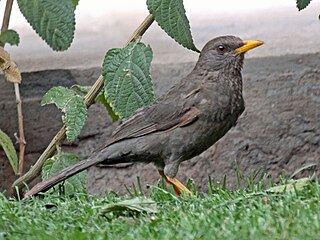 W
WThe Chiguanco thrush is a species of bird in the family Turdidae. It is found in Ecuador and the Altiplano. Its natural habitats are subtropical or tropical high-altitude shrubland and heavily degraded former forest.
 W
WThe Chinese thrush is a species of bird in the family Turdidae. It is found in China and far northern Vietnam. Its natural habitats are temperate forests and subtropical or tropical moist montane forests.
 W
WThe cocoa thrush is a resident breeding bird in South America from eastern Colombia south and east to central and eastern Brazil, and on Trinidad and some of the Lesser Antilles.
 W
WThe dusky thrush is a member of the thrush family which breeds eastwards from central Siberia to Kamchatka wintering to Japan, South China and Myanmar. It is closely related to the more southerly breeding Naumann's thrush T. naumanni; the two have often been regarded as conspecific. The scientific name comes from Latin Turdus, "thrush" and Ancient Greek eunomos, "orderly".
 W
WThe Ecuadorian thrush is a resident bird found in western South America in western Ecuador and far northwestern Peru. It was formerly considered to be a subspecies of the spectacled thrush, Turdus nudigenis, but has a narrower eyering, and is widely separated in range.
 W
WThe great thrush is a species of bird in the family Turdidae. It is found in Bolivia, Colombia, Ecuador, Peru, and Venezuela. It is considered as the largest thrush in South America. The great thrush's size distinguishes it from the several other uniform slaty-colored thrushes in its range. It inhabits subtropical or tropical moist montane forests and high-altitude shrubland, but can also make use of degraded forest and urban areas.
 W
WThe hermit thrush is a medium-sized North American thrush. It is not very closely related to the other North American migrant species of Catharus, but rather to the Mexican russet nightingale-thrush.
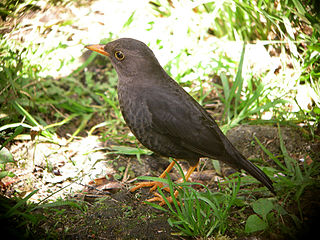 W
WThe island thrush is a common forest bird in the thrush family. Almost 50 subspecies have been described, ranging from Taiwan, through South East Asia and Melanesia, to Samoa, exhibiting great differences in plumage. Several subspecies are threatened and three have already become extinct.
 W
WThe Japanese thrush is a species of bird in the thrush family Turdidae. The species is also known as the grey thrush or the Japanese grey thrush. The species was once split into two subspecies, with birds breeding in China being treated as the subspecies T. c. lateus,, but today differences are attributed to natural variation and the species is treated as being monotypic.
 W
WThe Karoo thrush also known as Smith's thrush, is a member of the thrush family in Africa. It has traditionally been considered a subspecies of the olive thrush, but is increasingly treated as a separate species.
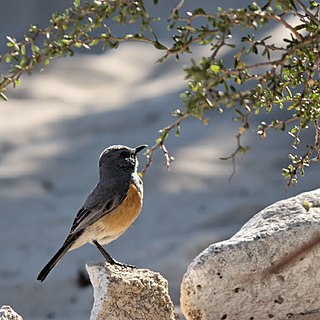 W
WThe littoral rock thrush, is a species of bird in the family Muscicapidae. It is endemic to Madagascar.
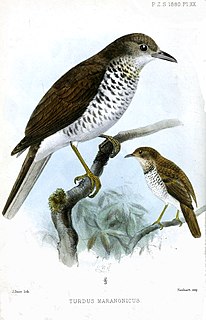 W
WThe Marañón thrush is a species of bird in the family Turdidae. It is found in far southern Ecuador and northern Peru. Its natural habitats are subtropical or tropical dry forests and subtropical or tropical moist lowland forests.
 W
WThe mistle thrush is a bird common to much of Europe, temperate Asia and North Africa. It is a year-round resident in a large part of its range, but northern and eastern populations migrate south for the winter, often in small flocks. It is a large thrush with pale grey-brown upper parts, a greyish-white chin and throat, and black spots on its pale yellow and off-white under parts. The sexes are similar in plumage, and its three subspecies show only minimal differences. The male has a loud, far-carrying song which is delivered even in wet and windy weather, earning the bird the old name of stormcock.
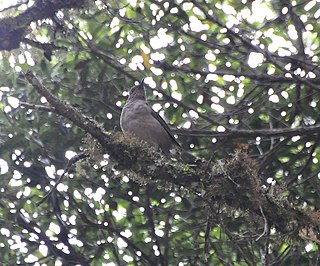 W
WThe mountain thrush is a large thrush which is found in Central America. It was formerly known as the mountain robin. Some authorities refer to it as the American mountain thrush to differentiate it from the Abyssinian thrush, known in their taxonomy as the African mountain thrush.
 W
WThe olive thrush is, in its range, one of the most common members of the thrush family (Turdidae). It occurs in African highlands from southern Malawi and Mozambique in the north to the Cape of Good Hope in the south. It is a bird of forest and woodland, but has locally adapted to parks and large gardens in suburban areas.
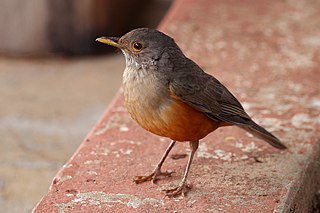 W
WThe rufous-bellied thrush is a songbird of the thrush family (Turdidae). It occurs in most of east and southeast Brazil from Maranhão south to Rio Grande do Sul states, Bolivia, Paraguay, Uruguay and central regions of Argentina.
 W
WThe Somali thrush, also known as the Somali blackbird, is a songbird species in the family Turdidae. It is endemic to Somalia.
 W
WThe song thrush is a thrush that breeds across the West Palearctic. It has brown upper-parts and black-spotted cream or buff underparts and has three recognised subspecies. Its distinctive song, which has repeated musical phrases, has frequently been referred to in poetry.
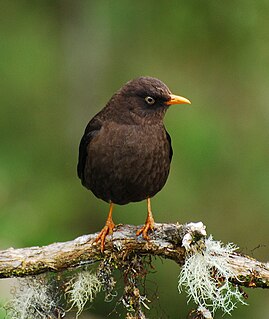 W
WThe sooty thrush is a large thrush endemic to the highlands of Costa Rica and western Panama. It was formerly known as the sooty robin.
 W
WThe pale thrush is a passerine bird of the eastern Palearctic belonging to the genus Turdus in the thrush family Turdidae. It is closely related to the eye-browed thrush and grey-backed thrush.
 W
WThe Várzea thrush is a resident breeding bird in the western Amazon. It is a cryptic species identified through molecular analysis of museum specimens. It was formerly considered conspecific with Hauxwell's thrush.